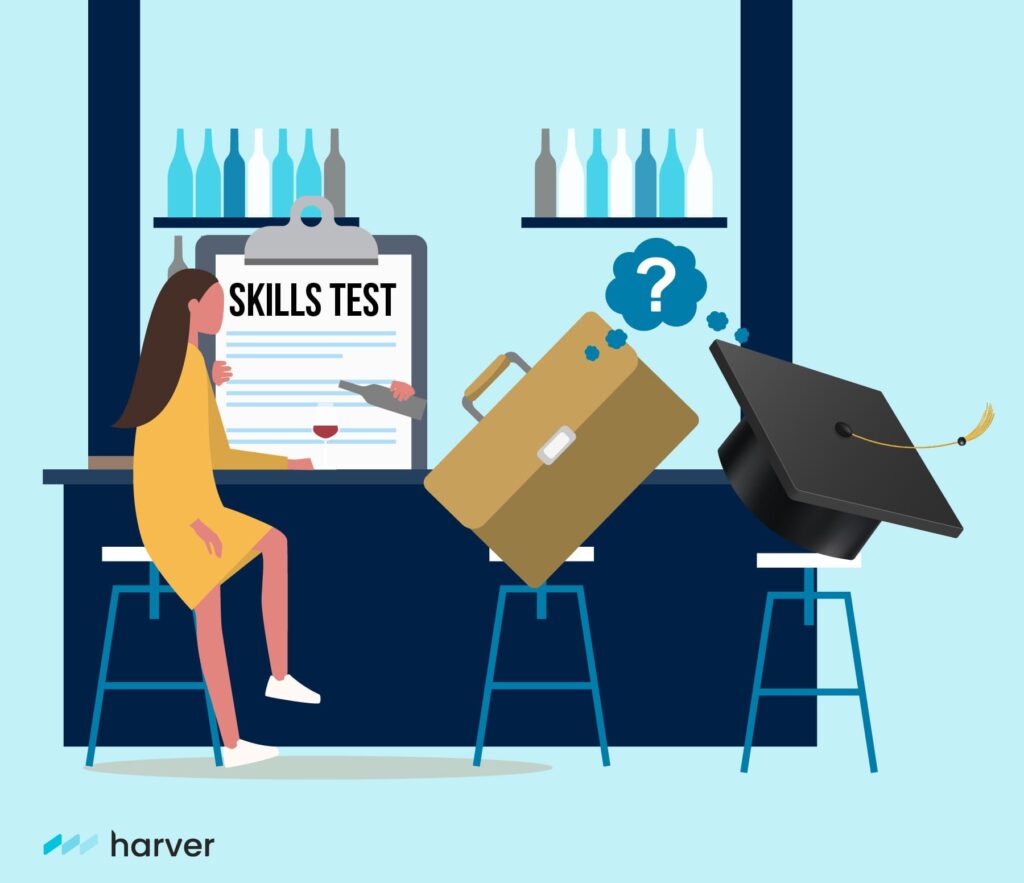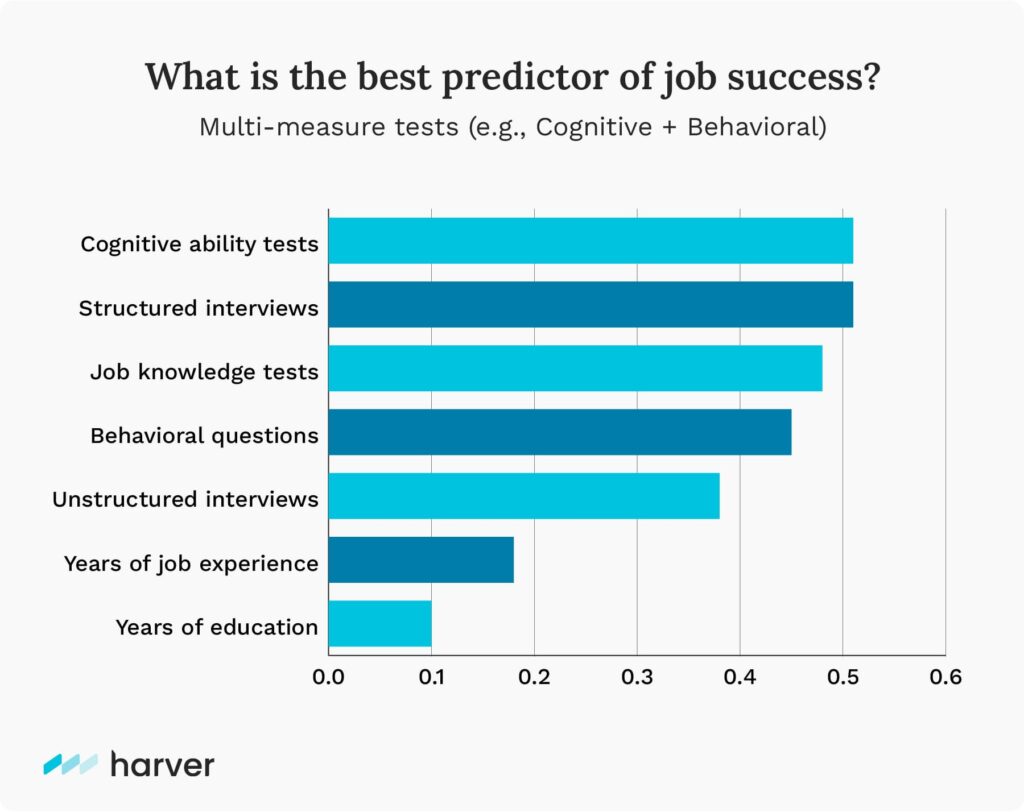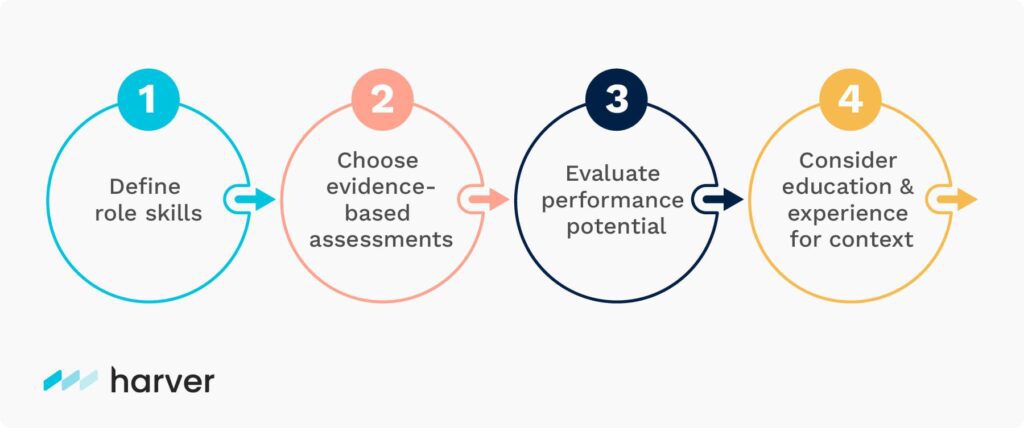Education and Experience walk into a bar. The bartender says, “Sorry, we’re looking for someone with actual skills.”

It’s a joke, although maybe not one that would kill at your average dinner party. But it also points to a very real problem in talent acquisition.
In hiring, it’s common to rely on education and years of experience as the first filters in the process. It’s what we’ve always done. It feels logical. It feels safe. It feels objective.
The science on predictors of job performance tells a different story.
Why Education and Experience Are Weak Predictors of Job Success
Across decades of research, studies from the OECD, CIPD, and the World Economic Forum consistently find the same thing: education and job tenure are weak predictors of how someone will actually perform. In the U.S., industrial-organizational psychology research going back to Schmidt and Hunter’s landmark studies in 1998 (and updated in 2016) has shown the same result.

A degree tells you where someone studied. It does not tell you how they think.
Experience tells you what they have done. It does not tell you what they can do next.
Neither provides a reliable measure of judgment, adaptability, or long-term success.
Why This Matters for HR Leaders
This isn’t to say education and experience are meaningless. They matter. They add context. They’re critical in certain roles—no one wants to be the test case for a surgeon’s first day.
But for a wide range of roles, especially those where collaboration, problem-solving, and adaptability matter most, these traditional filters only tell part of the story.
It’s like assuming someone is physically fit because they’ve had a gym membership for five years. Many of us—myself included—know from personal experience that assumption is just not true. Without knowing whether they ever showed up or what they did when they were there, you’re making a risky assumption.
There’s another cost as well. Over-reliance on degrees and linear career histories shuts out strong talent, essentially screening out strong candidates who gained their skills in less traditional ways.
A more effective alternative is to consider skills-based recruitment, which prioritizes natural talents and motivations over résumés. This approach helps organizations look beyond credentials and evaluate what truly drives high performance.
How Skills-Based Hiring Reflects Today’s Talent Market
Today’s workforce is more diverse in how skills are acquired. Someone can:
- Learn to code using online tutorials.
- Become fluent in multiple languages before turning 20.
- Launch and grow a profitable business from their bedroom.
With rising education costs, more people are choosing alternative ways to learn and work. These pathways can produce the same—if not higher—levels of capability as traditional degree programs.
Nonlinear career paths are also becoming more common. Freelance projects, side businesses, and startup experience build resilience, adaptability, and problem-solving skills. Unfortunately, these achievements often get overlooked because they don’t fit neatly into a traditional résumé format.
Forward-thinking organizations are embracing skills-based hiring, which focuses on demonstrated ability rather than where or how the skill was learned.
What Works Better: Evidence-Based Hiring
If your goal is to improve quality of hire and retention, you need to focus on what candidates can actually do and how they are likely to perform in your organization. That means assessing:
- Skills and capability: Can they actually do the work?
- Problem-solving ability: How do they approach new challenges?
- Learning agility: How quickly can they adapt?
- Accountability: Do they follow through?
- Interpersonal skills: Can they collaborate and communicate effectively?
These are stronger predictors of job performance than degrees or tenure. Organizations adopting skills-based hiring practices are using structured assessments, work samples, and realistic job previews to measure capability before making an offer.

You can also recruit for potential, ensuring you identify people who can grow into roles even if they don’t match a traditional career path today.
By going beyond resumes, employers open their process to skilled talent from diverse and unconventional backgrounds.
And when hiring decisions are backed by data-driven insights, they’re not guesswork—they’re a proven strategy for improving both quality of hire and retention.
Bringing Education and Experience Into Balance
Education and experience still matter. They provide useful context. But they shouldn’t be the main decision-makers in your process.
The best hiring outcomes come from balancing traditional qualifications with direct evidence of performance potential—and using the right tools to assess those capabilities at scale.
The bottom line: when Education and Experience walk into a bar—or your hiring process—make sure they’re sitting next to something more important: clear, measurable evidence of what a candidate can do and how they can grow.


